11 mar 2018
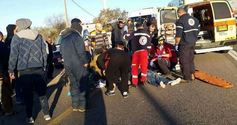
An Israeli settler driving at high speed hit a Palestinian boy afternoon Sunday and fled the scene.
According to local sources, an Israeli settler who was driving at high speed rammed his car into a Palestinian youth and fled right away, leaving the boy bleeding on the ground.
Israeli forces said a probe was launched to investigate the hit-and-run incident.
The youngster, aged 17, sustained injuries in his head and was evacuated by local medics to the Palestine Medical Complex in Ramallah, his family said.
Another Palestinian young man sustained wounds after dozens of Israelis residing in Yitzhar illegal settlement assaulted Palestinian lands in Nablus’s southern town of Madama and uprooted olive trees.
Heavily-armed Israeli patrols showed up in the area and targeted the Palestinian locals with heavy spates of bullet fire and teargas canisters.
A young man reportedly sustained injuries in his feet after Israeli settlers beat him using an iron bar. He was transferred to Rafidia Hospital for treatment.
According to local sources, an Israeli settler who was driving at high speed rammed his car into a Palestinian youth and fled right away, leaving the boy bleeding on the ground.
Israeli forces said a probe was launched to investigate the hit-and-run incident.
The youngster, aged 17, sustained injuries in his head and was evacuated by local medics to the Palestine Medical Complex in Ramallah, his family said.
Another Palestinian young man sustained wounds after dozens of Israelis residing in Yitzhar illegal settlement assaulted Palestinian lands in Nablus’s southern town of Madama and uprooted olive trees.
Heavily-armed Israeli patrols showed up in the area and targeted the Palestinian locals with heavy spates of bullet fire and teargas canisters.
A young man reportedly sustained injuries in his feet after Israeli settlers beat him using an iron bar. He was transferred to Rafidia Hospital for treatment.
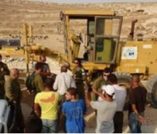
Israeli soldiers confiscated, Sunday, a Palestinian truck and a bulldozer while preparing to conduct work aimed at paving a new agricultural road leading to Palestinian lands in Qabalan town, south of the northern West Bank city of Nablus.
The soldiers invaded the area, and confiscated the truck and the bulldozer, in the as-Sroub area, east of Qabalan.
The Palestinians were trying to prepare for a new agricultural road, on their lands, to reach them with tractors and agricultural equipment.
This is happening while Israeli colonizers continue to illegally occupy Palestinian lands in the area, and are provided with infrastructure.
The soldiers invaded the area, and confiscated the truck and the bulldozer, in the as-Sroub area, east of Qabalan.
The Palestinians were trying to prepare for a new agricultural road, on their lands, to reach them with tractors and agricultural equipment.
This is happening while Israeli colonizers continue to illegally occupy Palestinian lands in the area, and are provided with infrastructure.
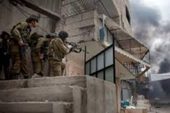
Dozens of Israeli soldiers invaded, on Sunday at dawn, several homes and stores in Doura town, south of the southern West Bank of Hebron, before violently searching them.
The WAFA Palestinian News Agency said the soldiers invaded many homes and stores in Sinjer neighborhood, in Doura, and violently searched them.
Furthermore, dozens of soldiers invaded various areas around Halhoul city, north of Hebron, including in many orchards and vineyards.
The soldiers also stopped and searched dozens of cars at main entrances of several towns, south of Hebron, and interrogated many Palestinians while inspecting their ID cards.
On Saturday, dozens of illegal Israeli colonizers invaded the at-Tiwana village, near Yatta, south of Hebron, and hurled stones at the residents while Israeli soldiers started firing gas at the Palestinians.
The WAFA Palestinian News Agency said the soldiers invaded many homes and stores in Sinjer neighborhood, in Doura, and violently searched them.
Furthermore, dozens of soldiers invaded various areas around Halhoul city, north of Hebron, including in many orchards and vineyards.
The soldiers also stopped and searched dozens of cars at main entrances of several towns, south of Hebron, and interrogated many Palestinians while inspecting their ID cards.
On Saturday, dozens of illegal Israeli colonizers invaded the at-Tiwana village, near Yatta, south of Hebron, and hurled stones at the residents while Israeli soldiers started firing gas at the Palestinians.
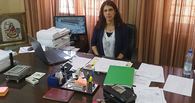
The Palestinian town of Hizma, north of Occupied Jerusalem, has been under tight inhumane siege for over 50 days as part of mass punitive measures taken by the Israeli occupation army against about 8,000 local residents in response to alleged stone-throwing attacks on Israeli vehicles.
This siege has led more than 160 owners of businesses and stores in the town to incur heavy losses, obstructed the daily movement of thousands of employees, workmen and students and deprived men under age 40 of leaving the town.
In addition, citizens from other Palestinian areas are not allowed to enter the town.
According to Hizma mayor Samar Salahuddin, the Israeli army started to impose a complete closure on the town on January 16, 2018 and since then the local residents have been exposed to ongoing persecution and humiliation at the hands of Israeli forces.
Salahuddin told the Palestinian Information Center (PIC) that the army paralyzed the daily life in the town and isolated it when it blocked all its entrances, including the vital northern entrance which connects its main commercial road with the north and south of the West Bank.
“The closure and siege on Hizma aims mainly to hit the economy and control the town and a wide area of its land as a prelude to carrying out several projects associated with the Greater Jerusalem plan and its E1 project, and isolating Hizma from its surrounding area because it is an important flank of Jerusalem and the link that connects the north of the West Bank with its south,” the mayor stated.
She pointed out that the Israeli occupation had already isolated Hizma residents from their mother city, Jerusalem, with the separation wall and a military gate.
The mayor has queried the Israeli claim that the closure on the town was in response to stone-throwing attacks on Israeli vehicles carrying settlers or soldiers on the road that connect Hizma with the towns of Jaba and Anata, stressing that the damage resulting from such Israeli punitive measure against the residents was larger than stones thrown or protests held by local young men.
Describing the main road of the town as the mainstay of its economy, the mayor affirmed that its closure by Israel made more than 150 business and store owners unable to fulfill their daily and monthly financial obligations towards their workplaces and employees after over 50 days of a stifling siege on the town. .
Moreover, the siege has disrupted the daily lives of university and school students, workmen and employees, who all need to leave the town.
“The greatest harm has afflicted the students of schools and universities, employees and workers, who leave early for study and work on a daily and regular basis. This closure has become a daily disturbance to them as they pass through checkpoints and concrete blocks, which were placed at the town’s entrances,” mayor Salahuddin stated.
The mayor pointed to the Israeli army’s daily raids on homes in Hizma and its detention of citizens. “The overnight campaigns are ongoing, in which several homes are stormed and searched, and arrests are made, while the occupation army keeps provoking citizens, especially the young men, in the central district of the town and its outskirts.”
She also highlighted other Israeli punitive measures taken against the residents, including the demolition of structures, homes, walls, roads and wells, and the deployment of barbed wire around the town.
“Farmers are also barred from getting to their lands and any agricultural tractors working or leveling roads in Area C [of the West Bank] are fined and confiscated,” she added.
This siege has led more than 160 owners of businesses and stores in the town to incur heavy losses, obstructed the daily movement of thousands of employees, workmen and students and deprived men under age 40 of leaving the town.
In addition, citizens from other Palestinian areas are not allowed to enter the town.
According to Hizma mayor Samar Salahuddin, the Israeli army started to impose a complete closure on the town on January 16, 2018 and since then the local residents have been exposed to ongoing persecution and humiliation at the hands of Israeli forces.
Salahuddin told the Palestinian Information Center (PIC) that the army paralyzed the daily life in the town and isolated it when it blocked all its entrances, including the vital northern entrance which connects its main commercial road with the north and south of the West Bank.
“The closure and siege on Hizma aims mainly to hit the economy and control the town and a wide area of its land as a prelude to carrying out several projects associated with the Greater Jerusalem plan and its E1 project, and isolating Hizma from its surrounding area because it is an important flank of Jerusalem and the link that connects the north of the West Bank with its south,” the mayor stated.
She pointed out that the Israeli occupation had already isolated Hizma residents from their mother city, Jerusalem, with the separation wall and a military gate.
The mayor has queried the Israeli claim that the closure on the town was in response to stone-throwing attacks on Israeli vehicles carrying settlers or soldiers on the road that connect Hizma with the towns of Jaba and Anata, stressing that the damage resulting from such Israeli punitive measure against the residents was larger than stones thrown or protests held by local young men.
Describing the main road of the town as the mainstay of its economy, the mayor affirmed that its closure by Israel made more than 150 business and store owners unable to fulfill their daily and monthly financial obligations towards their workplaces and employees after over 50 days of a stifling siege on the town. .
Moreover, the siege has disrupted the daily lives of university and school students, workmen and employees, who all need to leave the town.
“The greatest harm has afflicted the students of schools and universities, employees and workers, who leave early for study and work on a daily and regular basis. This closure has become a daily disturbance to them as they pass through checkpoints and concrete blocks, which were placed at the town’s entrances,” mayor Salahuddin stated.
The mayor pointed to the Israeli army’s daily raids on homes in Hizma and its detention of citizens. “The overnight campaigns are ongoing, in which several homes are stormed and searched, and arrests are made, while the occupation army keeps provoking citizens, especially the young men, in the central district of the town and its outskirts.”
She also highlighted other Israeli punitive measures taken against the residents, including the demolition of structures, homes, walls, roads and wells, and the deployment of barbed wire around the town.
“Farmers are also barred from getting to their lands and any agricultural tractors working or leveling roads in Area C [of the West Bank] are fined and confiscated,” she added.
10 mar 2018

Ali al-Hayek, Head of the Palestinian Businessmen Association in Gaza, called for taking an urgent action for offering financial aid to the private sector in the besieged Gaza Strip in light of the emerging crises due to the decade-long Israeli siege.
In a press statement on Saturday, Hayek said that the economic indicators affirm that the people of Gaza will not tolerate the bad living conditions in the coming few months in light of the absolute comprehensive deterioration of the humanitarian conditions in the blockaded coastal enclave.
The consumer purchasing power of the Gazan people has declined by 60% under the shortage of resolutions needed to end the current crises in Gaza, he said.
"Due to the Israeli blockade and also the internal Palestinian division that have been going on for 11 years, the poverty rate has jumped to 80% and the unemployment rate reached 50% as neither the public sector nor the private one was able to absorb more workers and graduates," Hayek said.
He called on Palestinian Authority President Mahmoud Abbas to alleviate the crises in Gaza by supporting the private sector and accomplishing the Palestinian reconciliation which has a key role in this regard.
He also asked international community and the human rights organizations to save the Gazan people by halting the deterioration of the humanitarian and economic conditions in the Gaza Strip.
In a press statement on Saturday, Hayek said that the economic indicators affirm that the people of Gaza will not tolerate the bad living conditions in the coming few months in light of the absolute comprehensive deterioration of the humanitarian conditions in the blockaded coastal enclave.
The consumer purchasing power of the Gazan people has declined by 60% under the shortage of resolutions needed to end the current crises in Gaza, he said.
"Due to the Israeli blockade and also the internal Palestinian division that have been going on for 11 years, the poverty rate has jumped to 80% and the unemployment rate reached 50% as neither the public sector nor the private one was able to absorb more workers and graduates," Hayek said.
He called on Palestinian Authority President Mahmoud Abbas to alleviate the crises in Gaza by supporting the private sector and accomplishing the Palestinian reconciliation which has a key role in this regard.
He also asked international community and the human rights organizations to save the Gazan people by halting the deterioration of the humanitarian and economic conditions in the Gaza Strip.
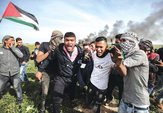
A group of Israeli settlers destroyed olive trees in a Palestinian land in Burin town south of Nablus city.
The Palestinian farmer Mohammed Zaben told the PIC reporter that settlers from the illegal settlement of Yitzhar had cut down 15 olive trees in his land located near a settlement road south of the town.
Zaben said that he was able to reach his land on Saturday for the first time since November 2017 after obtaining a prior permit from the Israeli occupation authorities and he was shocked seeing his trees destroyed.
The Palestinian farmer Mohammed Zaben told the PIC reporter that settlers from the illegal settlement of Yitzhar had cut down 15 olive trees in his land located near a settlement road south of the town.
Zaben said that he was able to reach his land on Saturday for the first time since November 2017 after obtaining a prior permit from the Israeli occupation authorities and he was shocked seeing his trees destroyed.
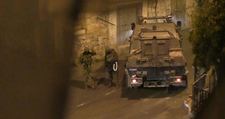
The Israeli occupation forces (IOF) at dawn Saturday stormed the eastern area of Nablus city and confiscated security cameras of several businesses there and also patrolled the vicinity of the old district and the eastern cemetery in the city.
Local sources reported seeing Israeli military patrols on streets in the eastern area of Nablus, adding that soldiers removed some security cameras of commercial stores.
The IOF stormed the same area last Thursday night and confiscated security camera recordings as part of a large-scale manhunt for young men accused of opening fire at the Huwara checkpoint two days ago.
The IOF also stormed at dawn today the vicinity of the Old City of Nablus, and searched the Danish park, the western cemetery, the area around the eastern cemetery and Faisal street.
According to eyewitnesses, an Israeli drone was overflying the area during the IOF campaign in Nablus.
Local sources reported seeing Israeli military patrols on streets in the eastern area of Nablus, adding that soldiers removed some security cameras of commercial stores.
The IOF stormed the same area last Thursday night and confiscated security camera recordings as part of a large-scale manhunt for young men accused of opening fire at the Huwara checkpoint two days ago.
The IOF also stormed at dawn today the vicinity of the Old City of Nablus, and searched the Danish park, the western cemetery, the area around the eastern cemetery and Faisal street.
According to eyewitnesses, an Israeli drone was overflying the area during the IOF campaign in Nablus.
9 mar 2018
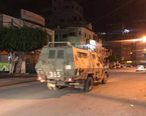
Several Israeli army jeeps invaded, on Friday at dawn, Beit Forik village, west of the northern West Bank city of Nablus, and confiscated surveillance equipment and recordings from stores.
The soldiers also abducted, on Thursday evening, five Palestinians at military roadblocks, near Nablus.
Media sources said the soldiers broke into many shops and violently searched them, before confiscating surveillance recordings and equipment.
The soldiers have been frequently invading Beit Forik, an issue which led to ongoing protests.
Many local youngsters hurl stones at the invading soldiers who fire live rounds, rubber-coated steel bullets, gas bombs and concussion grenades.
On Thursday at night, the soldiers abducted Sanad Sameeh Dmeidi, from Huwwara town, and Zakariya Abu Assab from Balata refugee camp, near the northern West Bank city of Nablus, after stopping them at Za’tara military roadblock, south of Nablus.
The soldiers also abducted Najeh Abdul-Rahman Awad, Sari Ibrahim Hamad and Omar Abdul-Fattah Saleh, after stopping them at a military roadblock near ‘Asira al-Qibliyya town, southwest of Nablus.
In related news, the soldiers invaded the home of Fateh movement secretary in occupied Jerusalem, Shadi Mitwer, and searched it, before handing his family a military warrant for his arrest.
It is worth mentioning that Mitwer is currently traveling out of Palestine, and the soldiers intend to abduct him upon his return.
The army also phoned Mitwer and informed him that he needs to return to the country and turn himself in to the military.
The soldiers also abducted, on Thursday evening, five Palestinians at military roadblocks, near Nablus.
Media sources said the soldiers broke into many shops and violently searched them, before confiscating surveillance recordings and equipment.
The soldiers have been frequently invading Beit Forik, an issue which led to ongoing protests.
Many local youngsters hurl stones at the invading soldiers who fire live rounds, rubber-coated steel bullets, gas bombs and concussion grenades.
On Thursday at night, the soldiers abducted Sanad Sameeh Dmeidi, from Huwwara town, and Zakariya Abu Assab from Balata refugee camp, near the northern West Bank city of Nablus, after stopping them at Za’tara military roadblock, south of Nablus.
The soldiers also abducted Najeh Abdul-Rahman Awad, Sari Ibrahim Hamad and Omar Abdul-Fattah Saleh, after stopping them at a military roadblock near ‘Asira al-Qibliyya town, southwest of Nablus.
In related news, the soldiers invaded the home of Fateh movement secretary in occupied Jerusalem, Shadi Mitwer, and searched it, before handing his family a military warrant for his arrest.
It is worth mentioning that Mitwer is currently traveling out of Palestine, and the soldiers intend to abduct him upon his return.
The army also phoned Mitwer and informed him that he needs to return to the country and turn himself in to the military.
8 mar 2018
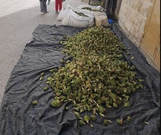
The Palestinian inhabitants of the towns and villages of the West Bank city of Salfit have complained about the growth decline of the Palestinian popular plant called al-Akoub (Gundelia) which was spread along large areas in the region due to the factories of the illegal Ariel settlement near Salfit.
Asma Balasmeh, a woman of Ezbet Abu al-Basal hamlet, said that the Israeli industrial area has affected the spread of Gundelia in the area because of leveling and construction works.
Asma Balasmeh, a woman of Ezbet Abu al-Basal hamlet, said that the Israeli industrial area has affected the spread of Gundelia in the area because of leveling and construction works.
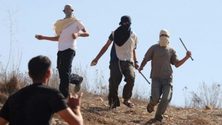
Israeli Jewish settlers attacked, on Thursday, Palestinian farmers as they were ploughing their land in the village of al-Sawiyeh, south of Nablus, according to a local official.
Ghassan Daghlas, who monitors settlement activities in northern West Bank district, said that settlers from the illegal settlement of Rahalim, built on al-Sawiyeh land, attacked the farmers and prevented them from ploughing their land.
The settlers also destroyed 40 fully grown olive trees owned by the Salman family, according to WAFA.
Meanwhile, said Daghlas, Israeli military authorities decided to seize land near Burin high school, south of Nablus, under the security pretext.
He said that the army had announced, two months ago, that it plans to seize land in Burin to build a fence that would separate the school and land in that area from the main Qalqilya-Nablus road and came back on Thursday to confirm with maps its decision to seize that land, warning that the fence may eventually cause residents to lose a lot more of their agricultural land, which is their only source of income.
Ghassan Daghlas, who monitors settlement activities in northern West Bank district, said that settlers from the illegal settlement of Rahalim, built on al-Sawiyeh land, attacked the farmers and prevented them from ploughing their land.
The settlers also destroyed 40 fully grown olive trees owned by the Salman family, according to WAFA.
Meanwhile, said Daghlas, Israeli military authorities decided to seize land near Burin high school, south of Nablus, under the security pretext.
He said that the army had announced, two months ago, that it plans to seize land in Burin to build a fence that would separate the school and land in that area from the main Qalqilya-Nablus road and came back on Thursday to confirm with maps its decision to seize that land, warning that the fence may eventually cause residents to lose a lot more of their agricultural land, which is their only source of income.

Israeli military bulldozers on Thursday morning moved into eastern Khan Younis province, south of the blockaded Gaza Strip.
A flock of Israeli bulldozers stationed along Gaza borders moved 50 meters into the eastern corners of Khan Younis.
The Israeli bulldozers also leveled Palestinian lands near the border fence.
Israeli army vehicles and patrols showed up on the borderland to escort the bulldozers.
According to eye-witnesses, the Israeli military opened fire toward Palestinian farmlands east of Khan Younis.
A flock of Israeli bulldozers stationed along Gaza borders moved 50 meters into the eastern corners of Khan Younis.
The Israeli bulldozers also leveled Palestinian lands near the border fence.
Israeli army vehicles and patrols showed up on the borderland to escort the bulldozers.
According to eye-witnesses, the Israeli military opened fire toward Palestinian farmlands east of Khan Younis.
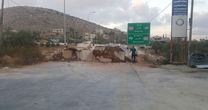
The Israeli occupation forces (IOF) on Wednesday blocked Palestinian agricultural roads to the east of Nablus city and near Ya’bad town, southwest of Jenin, with mounds of dirt and rocks.
According to local sources, an Israeli bulldozer escorted by soldiers closed agricultural roads near Beit Dajan town, east of Nablus, with piles of dirt and rocks.
The IOF also closed on the same day similar roads connecting the hamlets of Umm Riha and al-Makhal and leading to Ya’bad town, southwest of Jenin.
Municipal chief of Ya’bad Samer Abu Baker affirmed that the IOF closed those roads in the West Bank, adding that Israeli troops obstructed the movement of local citizens and prevented them from going to their cultivated plots of land.
Abu Baker noted that the IOF also barred villagers from al-Makhal hamlet from going to their homes.
According to local sources, an Israeli bulldozer escorted by soldiers closed agricultural roads near Beit Dajan town, east of Nablus, with piles of dirt and rocks.
The IOF also closed on the same day similar roads connecting the hamlets of Umm Riha and al-Makhal and leading to Ya’bad town, southwest of Jenin.
Municipal chief of Ya’bad Samer Abu Baker affirmed that the IOF closed those roads in the West Bank, adding that Israeli troops obstructed the movement of local citizens and prevented them from going to their cultivated plots of land.
Abu Baker noted that the IOF also barred villagers from al-Makhal hamlet from going to their homes.
7 mar 2018
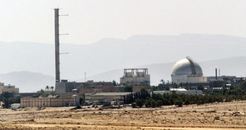
An Israeli study conducted in the area surrounding Dimona nuclear reactor in the Negev has revealed the possibility of radioactive waste being leaked from the reactor and some waste burial sites, thereby creating a potentially catastrophic environmental nightmare.
According to the study, floods and plants that penetrate the soil may help smuggle these toxic substances from burial sites to the environment.
Yedioth Ahronoth newspaper reported on Tuesday that the closed area around Dimona is used as a dumping ground for Israel's nuclear waste.
The waste is not buried inside buildings or well-prepared bunkers; rather, it is stored inside shallow containers that might wear out, crack and rust, which means that they may explode at any moment and the waste can be easily leaked.
The Hebrew newspaper said, based on the study, that the unknown amount of radioactive waste brought from Dimona, Soreq nuclear research center and other industrial facilities is only covered with a two-meter layer of soil.
Dimona nuclear reactor was established with the help of France in the late 1950s. Two other French reactors were built during the same period and closed in 1980.
According to the study, floods and plants that penetrate the soil may help smuggle these toxic substances from burial sites to the environment.
Yedioth Ahronoth newspaper reported on Tuesday that the closed area around Dimona is used as a dumping ground for Israel's nuclear waste.
The waste is not buried inside buildings or well-prepared bunkers; rather, it is stored inside shallow containers that might wear out, crack and rust, which means that they may explode at any moment and the waste can be easily leaked.
The Hebrew newspaper said, based on the study, that the unknown amount of radioactive waste brought from Dimona, Soreq nuclear research center and other industrial facilities is only covered with a two-meter layer of soil.
Dimona nuclear reactor was established with the help of France in the late 1950s. Two other French reactors were built during the same period and closed in 1980.
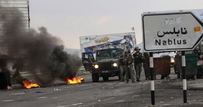
A Palestinian boy was shot and injured by the Israeli occupation forces on Wednesday in clashes rocking Nablus’s southern town of Burin, in the southern occupied West Bank.
Activist Ghassan Dughlas, who monitors settlement activity in the northern West Bank, said clashes flared up in Burin after Israeli settlers attacked a Palestinian shepherd in the eastern corners of the town.
17-year-old Mahmoud Umran was shot with live ammunition in his foot and was rushed to a hospital for urgent treatment.
Activist Ghassan Dughlas, who monitors settlement activity in the northern West Bank, said clashes flared up in Burin after Israeli settlers attacked a Palestinian shepherd in the eastern corners of the town.
17-year-old Mahmoud Umran was shot with live ammunition in his foot and was rushed to a hospital for urgent treatment.
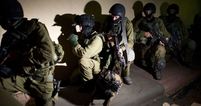
The Israeli occupation forces (IOF) arrested 10 Palestinians in raids and sweeps launched in the West Bank at dawn Wednesday.
A local source reported that the IOF stormed different areas in Nablus province, raided a number of residential buildings and searched them.
In another context, the IOF confiscated two truckloads of gundelia coming from al-Khalil city toward the central vegetable market in Nablus and ordered their owner, merchant Abdulraziq Abu Thabet, to pay a large fine.
A number of Palestinians were kidnapped during raids into Bethlehem, Ramallah and Salfit provinces.
Meanwhile, eyewitnesses told the PIC reporter that military vehicles were deployed in large numbers in the Jordan Valley as part of military exercises carried out by the Israeli army.
A local source reported that the IOF stormed different areas in Nablus province, raided a number of residential buildings and searched them.
In another context, the IOF confiscated two truckloads of gundelia coming from al-Khalil city toward the central vegetable market in Nablus and ordered their owner, merchant Abdulraziq Abu Thabet, to pay a large fine.
A number of Palestinians were kidnapped during raids into Bethlehem, Ramallah and Salfit provinces.
Meanwhile, eyewitnesses told the PIC reporter that military vehicles were deployed in large numbers in the Jordan Valley as part of military exercises carried out by the Israeli army.
6 mar 2018
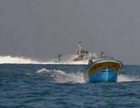
Israeli navy ships opened fire, Tuesday, at several Palestinian fishing boats, while the soldiers fired live rounds at farmers, in the southern and northern parts of the besieged Gaza Strip.
Eyewitnesses said the soldiers, stationed on military towers, east of Khan Younis, in southern Gaza, fired dozens of live rounds, east of Khan Younis, forcing the Palestinians to leave.
In addition, Israeli navy ships also fired live rounds at fishing boats, in Palestinian waters in the northern part of the Gaza Strip, forcing the fishers to return to the shore without being able to fish and provide for their families.
Eyewitnesses said the soldiers, stationed on military towers, east of Khan Younis, in southern Gaza, fired dozens of live rounds, east of Khan Younis, forcing the Palestinians to leave.
In addition, Israeli navy ships also fired live rounds at fishing boats, in Palestinian waters in the northern part of the Gaza Strip, forcing the fishers to return to the shore without being able to fish and provide for their families.
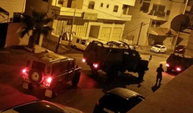
Israeli soldiers abducted, Tuesday, four Palestinians, including two siblings, in addition to damaging the contents of a shop and illegally confiscating cash, in the southern West Bank governorate of Hebron.
Media sources in Hebron said the soldiers invaded the al-Mooreq village, southwest of Hebron, searched many homes and abducted Mo’tasem Ramadan Awawda, and his brother Mahmoud.
They added that the soldiers also abducted Mohammad Nidal Jaber, from Hebron city, after assaulting him while he was heading to his work.
The soldiers also abducted Khaled Salahuddin Abu Za’rour, after invading his pluming store and ransacking it, in addition to illegally confiscating 4000 Shekels.
In relayed news, the soldiers invaded many neighborhoods in Hebron city, and installed roadblocks on roads leading to the towns of Sa’ir and Halhoul, in addition to the northern and southern roads of Hebron city, before stopping and searching dozens of cars, and interrogated many Palestinians while inspecting their ID cards.
In addition, the soldiers invaded Beit Ummar town, north of Hebron, also searched homes and summoned Ziad Ahmad al-‘Ajouri, 37, and Sami Amer Abu Jouda, 22, for interrogation in Etzion military base and security center, north of Hebron.
It is worth mentioning that the two Palestinians are former political prisoners, who were just released from Israeli detention centers two months ago.
The soldiers also fired gas bombs at the Big Mosque in Beit Ummar, causing many Palestinians to suffer the effects of teargas inhalation.
Media sources in Hebron said the soldiers invaded the al-Mooreq village, southwest of Hebron, searched many homes and abducted Mo’tasem Ramadan Awawda, and his brother Mahmoud.
They added that the soldiers also abducted Mohammad Nidal Jaber, from Hebron city, after assaulting him while he was heading to his work.
The soldiers also abducted Khaled Salahuddin Abu Za’rour, after invading his pluming store and ransacking it, in addition to illegally confiscating 4000 Shekels.
In relayed news, the soldiers invaded many neighborhoods in Hebron city, and installed roadblocks on roads leading to the towns of Sa’ir and Halhoul, in addition to the northern and southern roads of Hebron city, before stopping and searching dozens of cars, and interrogated many Palestinians while inspecting their ID cards.
In addition, the soldiers invaded Beit Ummar town, north of Hebron, also searched homes and summoned Ziad Ahmad al-‘Ajouri, 37, and Sami Amer Abu Jouda, 22, for interrogation in Etzion military base and security center, north of Hebron.
It is worth mentioning that the two Palestinians are former political prisoners, who were just released from Israeli detention centers two months ago.
The soldiers also fired gas bombs at the Big Mosque in Beit Ummar, causing many Palestinians to suffer the effects of teargas inhalation.
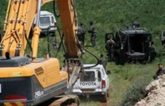
Israeli soldiers bulldozed, Monday, Palestinian farmlands and installed tents, in the al-Farisiyya area, in the West Bank’s Northern Plains.
The soldiers bulldozed large sections of a land planted with Hummus, and owned by a Palestinian, identified as Ahmad Daraghma.
The soldiers also bulldozed a farmland owned by Suleiman Abu Mohsin, in the same area and installed military tents, in addition to deploying several armored vehicles and tanks.
The soldiers bulldozed large sections of a land planted with Hummus, and owned by a Palestinian, identified as Ahmad Daraghma.
The soldiers also bulldozed a farmland owned by Suleiman Abu Mohsin, in the same area and installed military tents, in addition to deploying several armored vehicles and tanks.
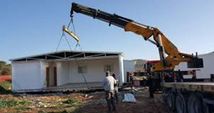
Palestinian customs check crews on Wednesday caught an Israeli dustcart carrying harmful waste, in an attempt to discharge them on Palestinian lands in Salfit.
A statement by the Environment Authority said the garbage truck was seized and driver interrogated, pending the finalization of necessary legal procedures.
It added that the infiltration contravenes Article 23 of Law N°7 of 1999 which prohibits waste disposal or burning in places other than those determined by the concerned authorities.
The Environment Authority added that recently Israeli dustcarts have been frequently spotted in Salfit, Tulkarem, Qalqilya, al-Khalil, and Nablus.
Palestinian locals have often complained that the waste spotted onboard Israeli trucks is harmful to the ecosystem and natural world for it includes insoluble materials and toxic chemicals.
A statement by the Environment Authority said the garbage truck was seized and driver interrogated, pending the finalization of necessary legal procedures.
It added that the infiltration contravenes Article 23 of Law N°7 of 1999 which prohibits waste disposal or burning in places other than those determined by the concerned authorities.
The Environment Authority added that recently Israeli dustcarts have been frequently spotted in Salfit, Tulkarem, Qalqilya, al-Khalil, and Nablus.
Palestinian locals have often complained that the waste spotted onboard Israeli trucks is harmful to the ecosystem and natural world for it includes insoluble materials and toxic chemicals.
5 mar 2018
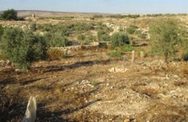
Israeli soldiers prevented, on Monday morning, many Palestinian farmers from Jayyous town, northeast of the northern West Bank city of Qalqilia, from entering their farmlands and orchards, isolated behind the Annexation Wall.
The soldiers stationed at the gate of the Annexation Wall, prevented hundreds of farmers from entering their lands, behind the Annexation Wall, west of the town.
The soldiers, stationed at Gate #935, refused to allow the farmers through, and did not provide any explanation for this act, while the farmers were trying to tend to their lands, their main source of livelihood.
The soldiers stationed at the gate of the Annexation Wall, prevented hundreds of farmers from entering their lands, behind the Annexation Wall, west of the town.
The soldiers, stationed at Gate #935, refused to allow the farmers through, and did not provide any explanation for this act, while the farmers were trying to tend to their lands, their main source of livelihood.
